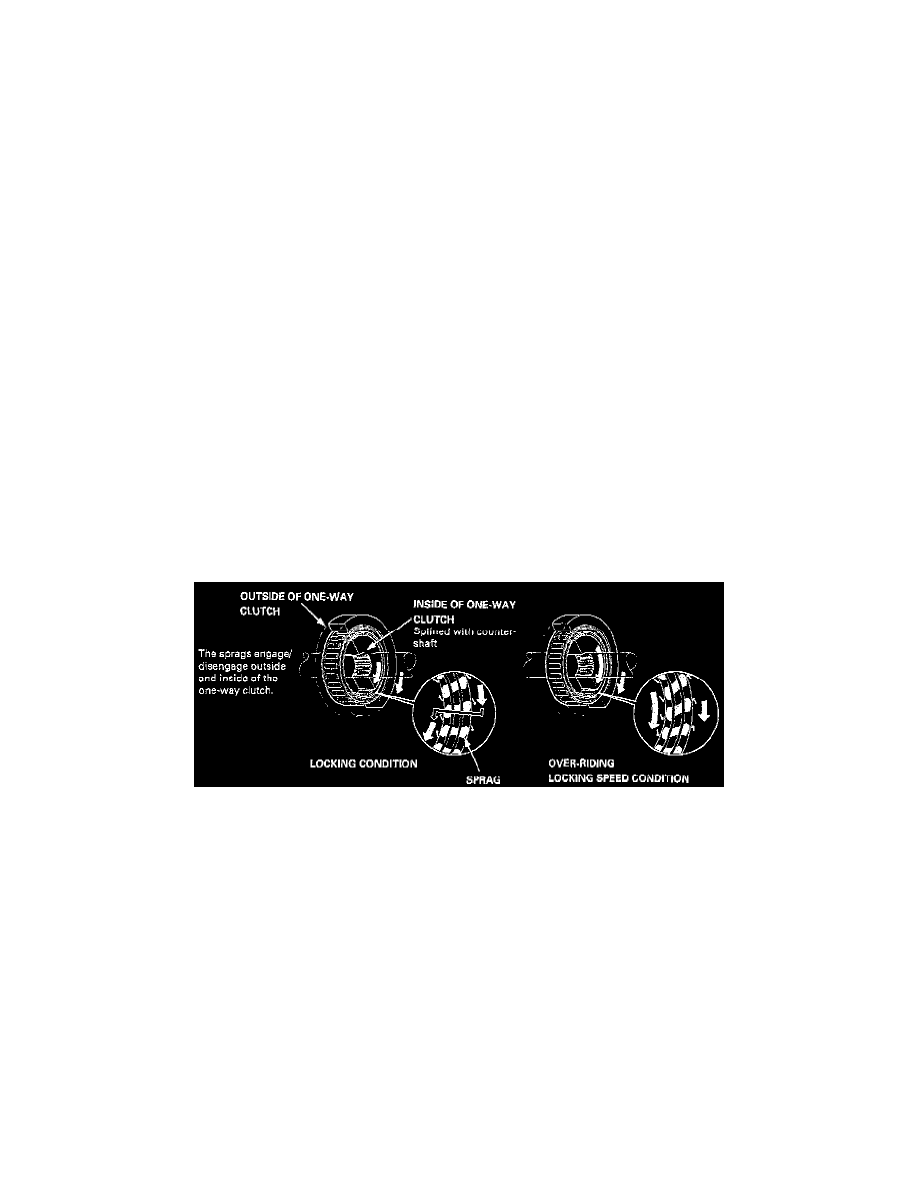TL V6-3206cc 3.2L SOHC MFI (1998)

Clutch: Description and Operation
DESCRIPTION
The four-speed automatic transmission uses hydraulically-actuated clutches to engage or disengage the transmission gears. When the hydraulic
pressure is introduced into the clutch drum, the clutch piston moves. This presses the friction discs and steel plates together, locking them so they don't
slip. Power is then transmitted through the engaged clutch pack to its hub-mounted gear. Likewise, when the hydraulic pressure is bled from the clutch
pack, the piston releases the friction discs and steel plates, and they are free to slide past each. This allows the gear to spin independently of its shaft,
transmitting no power.
1ST CLUTCH
The 1st clutch engages/disengages 1st gear, and is located at the middle of the mainshaft. The 1st clutch is joined back-to-back to the 4th clutch. The
1st clutch is supplied hydraulic pressure by its ATF feed pipe within the mainshaft.
1ST-HOLD CLUTCH
The 1st-hold clutch engages/disengages 1st-hold, 1 position or 2 position, and is located at the middle of the countershaft. The 1st-hold clutch is
supplied hydraulic pressure by its ATF feed pipe within the countershaft.
2ND CLUTCH
The 2nd clutch engages/disengages 2nd gear, and is located on the rear end of the mainshaft. The 2nd clutch is supplied hydraulic pressure by its ATF
feed pipe within the mainshaft.
3RD CLUTCH
The 3rd clutch engages/disengages 3rd gear, and is located at the end of the countershaft, opposite the rear cover. The 3rd clutch is supplied hydraulic
pressure by a circuit connected to the internal hydraulic circuit.
4TH CLUTCH
The 4th clutch engages/disengages 4th gear, and is located at the middle of the mainshaft. The 4th clutch is joined back-to-back to the 1st clutch. The
4th clutch is supplied hydraulic pressure by a circuit connected to the internal hydraulic circuit.
REVERSE CLUTCH
The reverse clutch engages/disengages reverse gear, and is located on the rear end of the countershaft. The reverse clutch is supplied hydraulic
pressure by its ATF feed pipe within the countershaft
ONE-WAY CLUTCH
This transmission has two one-way clutches: the 1st gear one-way clutch and the 2nd gear one-way clutch. The 1st gear one-way clutch is positioned
between the countershaft 1st gear and the one-way clutch hub, with the one-way clutch hub splined to the countershaft 2nd gear. The countershaft 1st
gear provides the outer race surface, and the one-way clutch hub provides the inner race surface. The 2nd gear one-way clutch is positioned between
the countershaft 2nd gear and the parking gear, with the parking gear splined to the countershaft. The countershaft 2nd gear provides the outer race
surface, and the parking gear provides the inner race surface. The-one-way clutches lock up when power is transmitted from the mainshaft 1st gear to
the countershaft 1st gear. The 2nd gear one-way clutch locks up when power is transmitted from the mainshaft 2nd gear to the countershaft 2nd gear.
The 1st clutch and gears remain engaged in the 1st, 2nd, 3rd, and 4th gear positions in the D3 or D4 position. However, the 1st gear one-way clutch
disengages when the 2nd, 3rd, or 4th clutches/gears are applied in the D3 or D4 position. This is because the increased rotational speed of the gears on
the countershaft over-ride the locking "speed range" of the one-way clutch. Thereafter, the one-way clutch freewheels with the 1st clutch still engaged.
